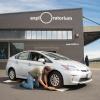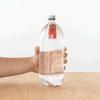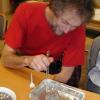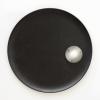Search Results
Showing results 1 to 17 of 17

Your Age on Other Worlds
Source Institutions
Did you know that you would be a different age if you lived on Mars? It's true!

A Cubic Foot Per Second
Source Institutions
In this activity, learners measure and calculate the amount of cubic feet various containers contain. Next, learners investigate cubic feet per second (cps), by carrying jugs in one second.

Whose Fault Is It?
Source Institutions
In this seismic simulation, learners play a "who-dunnit" game to explore earthquakes.

Scaling an Atom
Source Institutions
In this activity, learners make a scale model of an atom to see how big or how small an atom is compared to its nucleus. Learners will realize that most of matter is just empty space!

Tired Weight
Source Institutions
Yes, you can weigh your car by figuring out your wheel's tire pressure combined with the "tire's footprint." You'll need someone with a car, driver's license, and safety in mind.

Mid-Air Maneuver: Skateboard Science
Source Institutions
To understand how skaters turn in midair, try this little experiment! Individuals can do this activity alone, but it works better with a partner.

Three Circles of Pigments
Source Institutions
In this activity, learners overlap the three primary colors to see how all other colors are made.

Radioactive-Decay Model: Substitute coins for radiation
Source Institutions
Get a roll of pennies, throw them on the ground, then remove those that only show tails, and repeat with the ones left over.

Vocal Visualizer
Source Institutions
With a bit of PVC, a laser, a can/cup, and a small mirror, you can make a device that visualizes you voice or any sound transmitted into the cup/can.

Condiment Diver
Source Institutions
In this hands-on activity, learners make the world's simplest Cartesian diver, using only a plastic bottle, some water, and a condiment packet.

Ionic Bonding Puzzle Lab
Source Institutions
In this activity, learners create models of ionic compounds and observe the chemical formula of binary molecules they have created.

Electrostatic Water Attraction
Source Institutions
In this activity, learners conduct a simple experiment to see how electrically charged things like plastic attract electrically neutral things like water.

Mass of the Earth
Source Institutions
In this activity, learners use basic measurements of the Earth and pieces of rock and iron to estimate the mass of the Earth.

Spinning Cylinder: Make a triangle appear on a spinning wheel
Source Institutions
Spin a short piece of PVC pipe that's been marked up, and watch a triangle appear. Enjoy this optical illusion from the Exploratorium's Science Snack series.

Mix-N-Match Light
Source Institutions
This is an online exhibit about color perception. Learners set a random background color and then try to mix red, blue, and green light to match.

Momentum Machine: Speed up your spin
Source Institutions
Spin in an office chair holding milk jugs! Plus, learn physics. Very fun (but stay safe) activity from the Exploratorium Science Snacks series.

Balanced Budget Chemistry
Source Institutions
In this activity, learners balance chemical equations and discover the law of conservation of mass. Learners use coins to model molecules to balance the equations.
